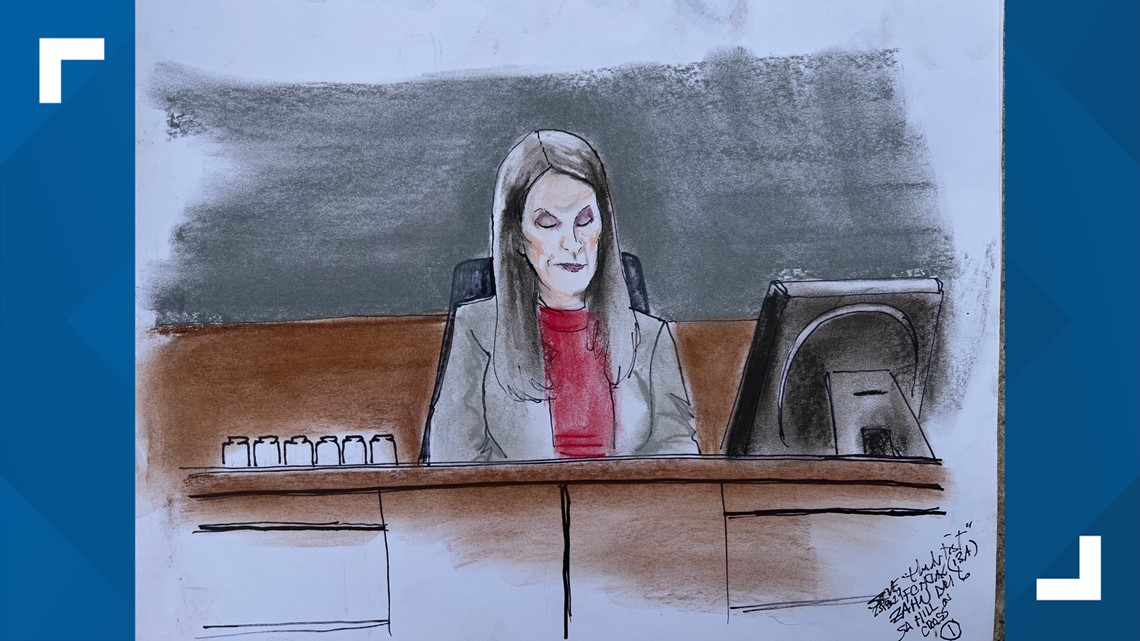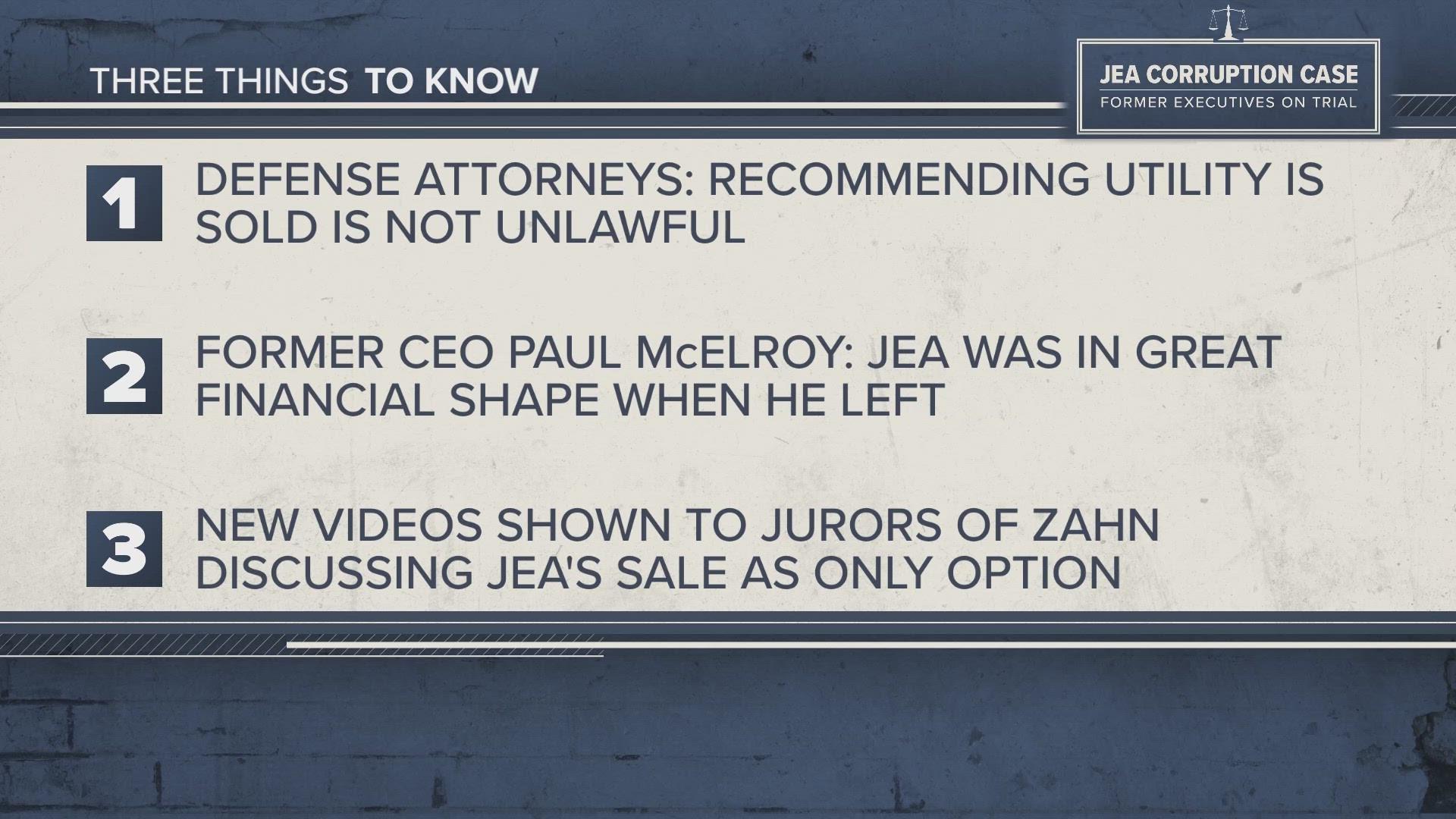JACKSONVILLE, Fla. — This story has been updated to reflect the second half of Friday's testimony.
The first week in the case against former JEA executives Aaron Zahn and Ryan Wannemacher, charged with conspiracy and wire fraud, continued Friday with evidence to bolster accusations of their deception.
Zahn and Wannemacher are accused of masterminding and concealing a plan to make hundreds of millions of dollars off a potential privatization and sale of JEA. After a moment referred to by witnesses as ‘Petway’s mic drop,’ outgoing board member Tom Petway told the board that he thought JEA needed to sell, throwing an idea that had come and gone back into the ring.
Zahn was a newly-minted CEO at the time of the sale discussion. His attorneys painted him as a young upstart who was asked to come in with innovative ideas, and did just that. Wannemacher’s attorney echoed that he was “just doing his job.” But, prosecutors say when the sale conversation began, Zahn and Wannemacher smelled blood in the water and zeroed in on an opportunity.
The ‘death spiral’ argument
Prosecutors say Zahn and Wannemacher lied to the board, their employees and the public, saying that JEA was failing, sweetening the idea of selling the utility to make up revenue. Evidence of what has been called Zahn’s “death spiral” narrative was the focal point of the trial’s first week. But, the CEO who took over when Zahn was ousted, testified JEA was in fine shape, nearly identical to when Zahn was appointed to his position.
Zahn’s attorney Eddie Suarez agreed that JEA was in fine shape. He said Zahn did not lie: He never believed, or spread, a pessimistic outlook on JEA. In fact, Suarez countered Zahn never said the words “death spiral,” except for when he was reassuring someone JEA was doing the opposite.
The primary evidence otherwise: Videos of Zahn and Wannemacher speaking to the JEA board at publicly-broadcast meetings. These videos were displayed during the testimony of FBI agent Angela Hill, who worked with the United States government in this case.


A frog in a pot
Before the sale effort began, Zahn, Wannemacher and then-COO Melissa Dykes presented the board with a forecast so dire that the utility needed to consider layoffs. Prosecutors showed video of a board meeting in June 2019, where Zahn told the board what was known as his favorite parable (notably a myth): If a frog is in a pot of boiling water, and you heat the water, it will not jump out. For Zahn, JEA was the frog, doom encroaching slowly.
At the June meeting, Zahn gave a lengthy presentation where he showed examples of old school industries that he believed have been played out: Taxis outsold by Uber, film cameras outplayed by digital cameras, hotels overrun by Airbnb. It was a point later reiterated by Wannemacher, who said at a fateful July meeting that JEA was faced with a “binary choice” to “shrink, or grow.”
Layoffs weighed against sale
By a July 23, 2019 meeting, Zahn was prepared to leverage employees against the decision to sell. The jury watched the board vote to pursue a sale, or choose another money-saving plan, which, among other things, would lay off 29% of employees — 574 people.
Faced with this choice, the board voted to start pursuing leads on a sale.
During her testimony, Hill confirmed all of these videos were viewed by the FBI and considered proof of the crimes. An element of a conspiracy charge can be “agreement to lie.”
Wannemacher and Zahn crafted a plan that prosecutors say was a scheme to make a fortune. An investigator with the State Attorney’s Office testified earlier in the week that when he looked at the plan, he understood “some people were going to get very rich off the sale of JEA."
Their plan involved offering “performance units,” essentially shares of JEA, to employees. Executives like them would have the most access to these shares. While their defense claims the numbers were just theoretical, prosecutors say that behind closed doors, they calculated the shares could skyrocket from a value of $0 to a value of $11,500 each over time, yielding them hundreds of millions.
Zahn’s defense responds to ‘death spiral’
During the second half of the day, Zahn’s attorney, Eddie Suarez, cross examined Hill. He provided a counterargument to the premise that Zahn and Wannemacher lied about JEA’s financial state. Videos appeared to show a contrast to the clips shown earlier, where executives praise the performance of JEA.
Most of the positive comments shown were from meetings before the June meeting where Dykes, Zahn and Wannemacher told the board they were in a dire situation.
He played clips of a March 2019 meeting, where the board praised how well JEA was performing. Wannemacher says they are seeing “outstanding” results.
He also showed clips from the July meeting, where the board voted on whether or not to drop 574 employees, where then-COO Dykes talks about “outstanding” metrics — though she also was the one to present a timeline for the layoffs that day. The video of her presentation on layoffs was shown earlier in the day by Assistant United States Attorney Tysen Duva.
Suarez clarified with Hill that the tone of these comments, collectively, did not reflect “doom and gloom,” and she agreed.
Suarez played a clip from a May 2019 meeting, which was emphasized by the prosecution on Thursday, where board member April Green told the executives to develop a plan with “no restraints.” He asked if developing plans for a sale could fall under the umbrella of a plan with no restraints, and Hill confirmed.
He discussed an email that JEA received from a consultant, which suggested that using terms like “utility death spiral,” would help their case. Hill said she was aware this was a term that was used in the utility industry. (To this end, the prosecution could also have been speaking metaphorically when they said Zahn claimed JEA was in a death spiral.)
A video of board member Alan Howard using the term was also shown, suggesting the comment may have originated with him.
This email also suggested that they use the examples of Kodak and Uber, which Zahn did use in the June meeting.
Jim Felman, Wannemacher's lawyer, elected not to cross examine Hill.
Jury fatigue already an issue
Suarez joked about the jury tuning out of the case, asking his paralegal to pause an exhibit because the jury must be “starting to think this was a Martin Scorcese movie and is three hours.”
The length and dense content of the case has been a repeat topic, with attorneys often remarking that they are trying to move quickly so as not to waste time.
When questioning Hill over a 45-page word document, Suarez remarked he would not be showing her the entire thing because “the jury would be very angry with me.”
While playing a video of a presentation by JEA board member Herschel Vinyard, Suarez stopped the tape after several minutes, saying that he would like to pause it “as an act of mercy for all of us.”
Some jury members appeared weary by day three. At one point toward the end of the day, two jurors were slumped over, though — seemingly — awake.
Suarez even referenced how long his own questioning of Hill, who was on the stand for much of Thursday and all of Friday, was taking too long. He noted that a board meeting he was showing was very long, “much like this examination.”
Judge Brian Davis cut off testimony around 5:10 p.m., saying he believed the courtroom had worked hard and should be able to go home.
The trial is expected to last for a month. The prosecution has said their witnesses are expected to last eight or nine days.

